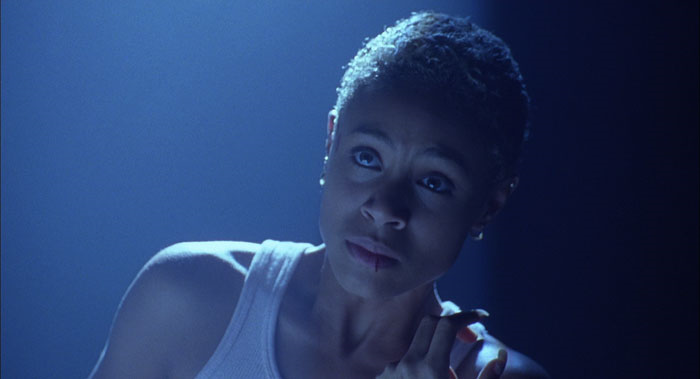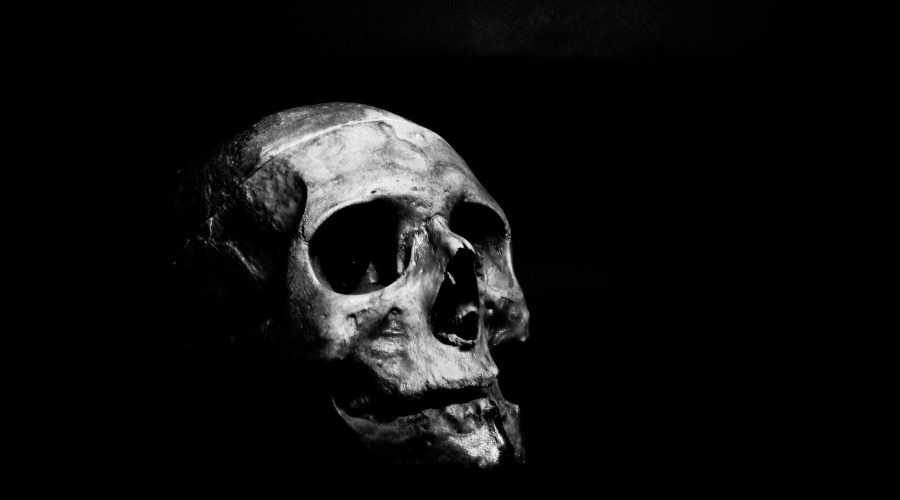My Black Trauma Is Mine and I Can Write It If I Want To!
Often, social media argument points come and go before they take root and fester. Those that don’t gain traction fade away into the night, as they should. Others linger and mutate and grow until they can’t be ignored any longer. Some of those hot takes should also disappear; but, alas, one of these has evolved into a full blown “thing” and as per the usual suspects making bad faith arguments, the whole topic has turned into yet another cudgel with which to beat marginalized writers over the head. Most specifically, Black horror creators.
Photo credit: https://tenor.com/view/joseline-hernandez-beat-me-you-know-sassy-you-cant-beat-me-up-gif-15951304
Just about anyone who hangs around horror writing Twitter has heard some variation of the “Black trauma on screen/in writing is evil and should be exorcized” talking points. At the risk of being redundant—yes, I’ll probably make this disclaimer every time I decide to say something to the public because I refuse to waste time on arguing personal opinions: there isn’t much basis for argument within those—everyone is entitled to like and dislike whatever they want. But when the thing folks decide they don’t want gets in the way of honest and authentic expression by Black creators, real damage can be done to how much content by Black creators actually makes it into books and onto screens.
And I’m of the mind that this damage is intentional on the part of a large group of the folks yelling into the microphone on this. They want to put further limitations and gatekeeping in the way of more Black stories being told by Black creators. The scant few produced each year are already too many for these folks—putting up more barriers can decrease that few to almost none, like in the “good old days”. Other folks buy into this idea and hop on the “We shouldn’t be showing Black trauma porn in the glorification of Black suffering” train and might think they’re doing a societal good. There are a few issues with both iterations of this take, however, as any censorship on these topics won’t likely play out the way the folks in the second group think it will.
Horror is a genre that’s largely defined by what frightens us or makes us uncomfortable. Horror isn’t about bunnies and unicorns, unless those critters are going to go rogue and create a human flesh-eating group amongst themselves, for example. The central idea of horror is to show those things that are horrific or discomfiting. Whether this is subtle, quiet horror or in your face, graphic splatter horror, the entire genre is built on discomfort of varying degrees. Advocating that only happy and uplifting topics and experiences be depicted in horror medium negates the tropes and foundation of the genre. Horror ain’t about happy feelings in the air and everywhere, like Brother Frankie Beverly and Maze preach.
Photo credit: https://tenor.com/view/thats-not-how-it-works-nope-no-disagree-wrong-gif-5102428
Slavery is an unfortunate fact of history that serves as a factual foundation for some horror media. It’s big brother, racism, is also a horrific fact of past and current experiences for large numbers of Black people. Poverty is a close runner up. Blocking depictions of slavery, racism, or even poverty from horror media negates real history. It also contributes to the further erasure of these experiences even as they continue to happen in real time. Can horror work be created without showing these facts on screen? Absolutely. But should the horror genre reject these depictions in favor of lighter, feel-good content?
Well, now, that’s a whole other conversation.
Speaking for myself as a Black horror creator, my personal experiences include a variety of upsetting circumstances/facts: slavery, racism, sexism, abuse, rape, and poverty, to name a few. I find inspiration in writing about these experiences because I find they fit in perfectly with the underlying theme of creating discomfort in works of horror while also bringing awareness to these issues—and some modicum of justice in the stories I create which doesn’t often happen in real life. These things happened to me. Are happening to me. To tell me I can’t write about them because it’s only trauma porn and shows Black people suffering invalidates them as my personal experiences. Without the motivation I gain from these ills, I’d scramble about for other things to write about that wouldn’t be as authentic. I can certainly write things that are less upsetting to other folks. I could also mute the genuine pain I feel from these circumstances so my work is more palatable to audiences. So, do I stop writing about my authentic Black experiences?
I. Will. Not.
Photo credit: https://tenor.com/view/shoot-diandra-lyle-beauty-and-the-baller-gif-9430209
This is the main point of nuance here that I think the overall conversation is missing: I own this trauma—it’s mine. Because it has all happened to me, I’ve earned the right to shine a light on all of it, to manipulate it into creations of my own that embody my work as a creator. I’m not an outsider narrating these events for the pleasure of an audience caught up in rapture over the idea of Black people suffering in front of their eyes. These horrendous elements comprise my life’s story and I’m not ashamed of any of it. It happened. I work through it. I live with it; but, I’m also inspired by revealing it and calling it out in the hopes that the next victim doesn’t have to endure it. I write about these things so we can eradicate them.
Hiding Black experiences and insisting on happy, glitter, rainbow horror about Black people perpetuates stereotypes of happy enslaved people glad to be mistreated. Of Black women as enthusiastic participants of their own degradation and rapes. Of people forgetting the sometimes overwhelming effects of ongoing racism and poverty. As the great Zara Neale Hurston truthfully stated: “If you are silent about your pain, they’ll kill you and say you enjoyed it.”
I ain’t buying into this request to stay silent about my Black experiences. Silence is complicity and I’ve dedicated myself to a lifelong, big, loud, and vicious fight against these issues.
Photo credit: https://tenor.com/view/loud-yelling-preach-angry-passionate-gif-4718708
That said, I do feel there’s room to critique these depictions, genuinely. Is it obvious when creators who aren’t familiar with the horror genre—but have an enormous platform—want to just throw out any old thing with Black folks in it, add in some racism and blood, and call it horror to cash in on the current horror craze? Yes. But not any more out of pocket when other creators do the same, minus the Black folks. Is it soul crushing when the most plot lacking vehicles that show frame after frame, page after page, of Black people being tortured with no relevance to the overall storyline are picked up for production when there are a gazillion Black horror creators out here producing more solid content that could have been picked up, instead? Again, yes. But these are different arguments about who gets access and opportunities versus who doesn’t.
What I’m ultimately asking is that participants in this kerfuffle consider the outcomes they’re supporting. Seeing images and topics on screen and in print that you don’t like or that make you uncomfortable is the goal of the horror genre. Maybe horror ain’t for you if you’re totally beside yourself when you see Black people enduring horrific things many Black people have experienced and are still experiencing (the key word there is “horrific”, as in, using the root word “horror”). How is your “fight” helping Black horror creators when you’re advocating for erasing a huge swath of authentic experiences from the horror storytelling canon because it hurts your feelings? Further, I’d like you to consider whether or not you were just as loud and vocal about the horror travesty that was Ghosts of War when it came out. Did you seek to cancel horror based on images of war and the insensitivity perpetuated upon traumatized soldiers who had their PTSD flaunted across the screen in a virtual mimicry of their suffering?
Photo credit: https://tenor.com/view/looking-searching-where-gif-7238063
Nope. That didn’t happen. And I know why. The loudest outcries on this have been reserved for movies like Antebellum, which happened to focus on slavery and centered the unique suffering of the Black, female character. Series’ like Them and Lovecraft Country, which also focused on Black people and magnified some issues faced by Black women.
This type of selective outrage shows the ugly underpinnings of not only working against content that centers Black experiences but also against Black creators who may use these experiences in our work. It’s very telling that Black trauma is acceptable when some people use it, especially in other genres. I insist that the horror genre is a fertile battleground for these depictions. This is our trauma. Our grief. Our lives. It can be exhausting, horrifying, and desperate. We can write it if we want to.
R.J. Joseph is a Bram Stoker Award® nominated writer who finds joy in writing about the intersections of race and gender in the horror genre and popular culture. She can be found on Twitter and IG: @rjacksonjoseph.



Recent Comments